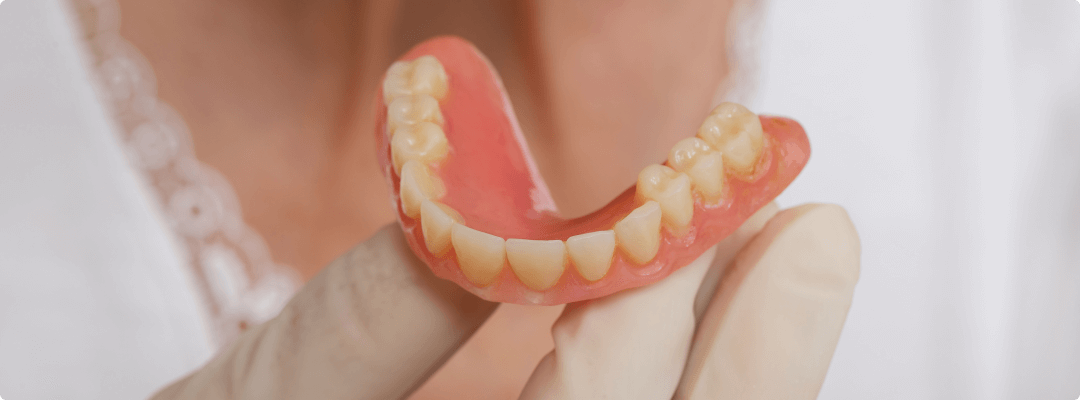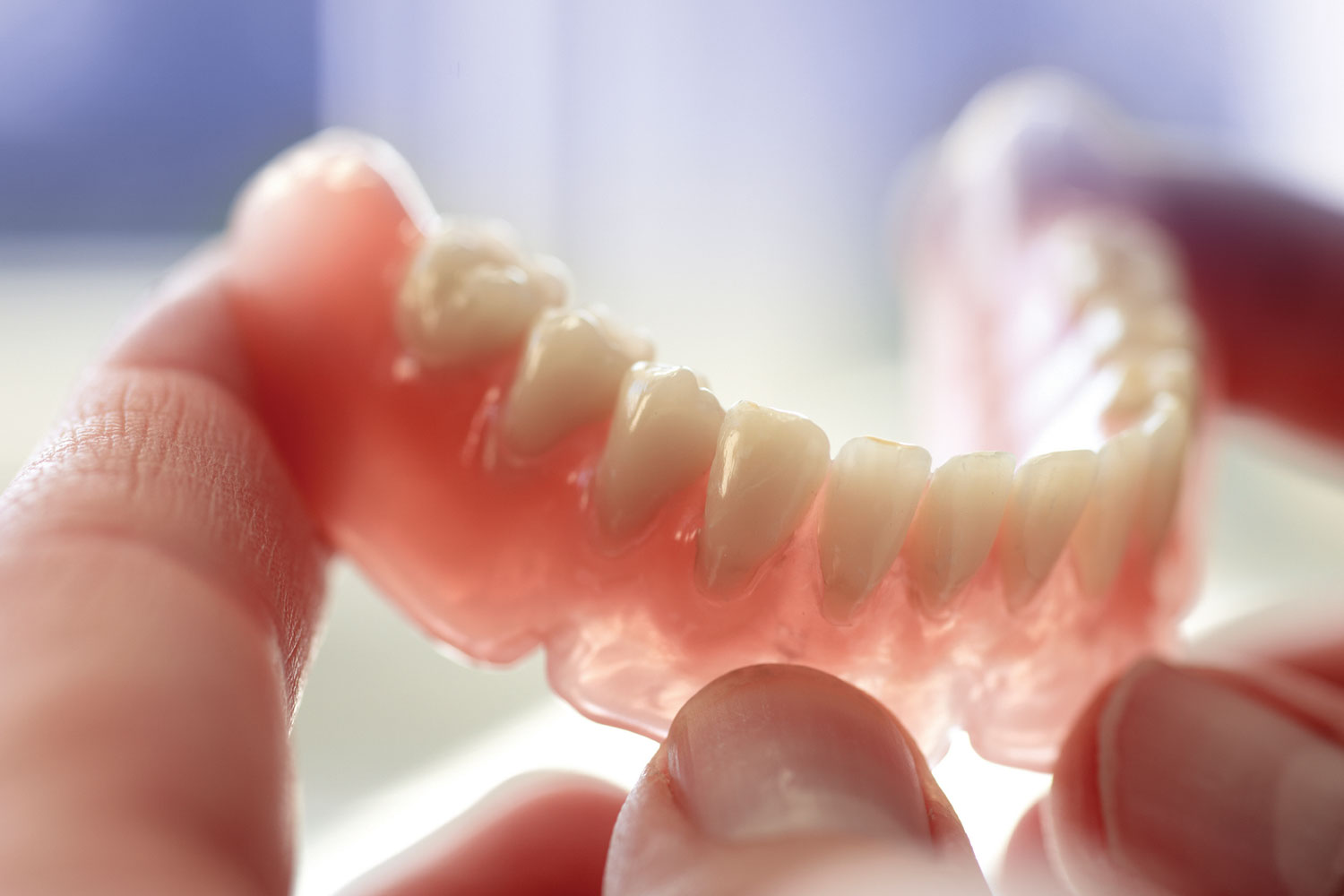New generation dentures are definitely better in quality and aesthetics than their outdated predecessors, but they still create difficulties for patients that not everyone can overcome. We will tell you why a removable, artificial jaw is nothing more than a temporary solution to the problem of partial or complete absence of teeth.
The inevitable consequences of removable dentures
Removable dentures are prosthetic structures that replace one, several, or all teeth at once. Based on this, they come in partial, full, and braces. As for the material from which the denture base is made, it can be made of silicone, nylon or acrylic. Fixation of dentures in the jaw occurs due to natural protrusions on the gums or special hooks and locks.
Dentists use removable dentures in various situations. For example, in order for the patient to eat and socialize normally while waiting for the permanent fixed structures to be made, the doctor gives him a removable denture for a while. It is inexpensive and allows you to hide the cosmetic defects of missing or ground teeth. But no more than that. Any full restoration of functionality and aesthetics is out of the question. And a competent specialist will never advise his patient a temporary orthopedic construction with a short service life for permanent use, and here’s why.
Gum inflammation
Gum inflammation is the first thing a patient who has deliberately chosen removable dentures for long-term use will have to deal with. In addition to an allergic reaction to acrylic, nylon or metal, which may occur immediately or some time after the denture is fitted, your gums will have to undergo a difficult process of adaptation to an unfamiliar removable structure. For some people, this stage lasts a few months, while others experience discomfort and painful sensations for several years. Everything is very individual and unpredictable. Naturally, the removable orthopedic design will be made exactly according to your impressions, but how your gums will take such loads – no orthopedist can predict before installation.
Painful sensations will occur at every meal, especially at first. You will have to give up some hard or tough foods. Porridge, soups, apples and pears cut into small pieces are what will be part of your daily diet. Even soft, fresh bread, which turns into a sticky mass when chewed, will instantly stick to the denture.
Sometimes a person may experience loss of taste and increased salivation. But this is not the worst thing. Traumatic stomatitis and sores arising from the constant rubbing of the gums – those diagnoses with which sooner or later turns to the doctor almost every owner of removable dentures. It is good if the ulcer does not become chronic and does not develop fibrous tissue. Otherwise, you will need treatment from an oncologist.

Bone atrophy
The root of the tooth, which is located deep in the bone, performs very important functions. In addition to securely anchoring the tooth itself in the jaw, it places the necessary load on the bone tissue. As soon as the tooth is removed together with the root, the bone begins to gradually resorb and atrophy due to the lack of load. Bone atrophy leads to unpleasant consequences, such as:
- change in appearance, rapid aging of the face
- displacement of teeth, bite disorder
- impaired functionality of the gastrointestinal tract and temporomandibular joint.
Bone tissue is only fully functional if it is constantly loaded Removable dentures replace only the crowns visible when smiling. Therefore, if you use them for a long time, you will be surprised to find that there is a small gap between the denture and the gum – this is the beginning of the process of bone atrophy, which will only progress over time without taking drastic measures.
Habituation
Perhaps the most difficult thing to get used to after fitting removable dentures is to get used to them. The very fact of partial or complete absence of teeth can negatively affect the psychological state of the patient, and then there is an unsightly jaw floating in a glass of water, which daily reminds a person of his physiological shortcomings. It is not far to depression!
Indeed, the lack of teeth greatly reduces the quality of life, but removable prosthesis in some cases only exacerbates the problem. Remember the funny videos when a person’s dentures accidentally fall out. It can happen anytime: while talking, eating, or even blowing out candles on a birthday cake. But imagine how embarrassed the person feels in front of others! Because of the fear of being in such a situation, people with removable dentures tend to be insecure, shy and reluctant to make contact.
Of course, you can go along with the advertising and use special creams or gels to fix the denture in the jaw, but like any chemical product, they are not always harmless to the body. Even a small ingestion of cream can lead to allergies, nausea, vomiting and other digestive problems. And the effectiveness of this fixing agent is questionable: under the influence of saliva, water, food, it is gradually washed out and reduces its effect after a couple of hours.
It is difficult to get used to removable prostheses, you will constantly experience the feeling of a foreign body in your mouth. Even the more advanced removable dentures without a palate cause a lot of discomfort:
- they need to be removed frequently
- they damage the enamel of neighboring teeth
- chafe the gums, leading to hypoxia
- cause allergic reactions
- break easily
Removable dentures, regardless of their cost, are just an imitation that cannot fully claim to be the main method of replacing missing teeth. They can only be used for a limited period of time without compromising your health. That is why dentists throughout the civilized world have long ago abandoned removable prosthetics on a permanent basis, opting for the latest implant technology.

A modern alternative to removable prosthetic structures – prosthetics on implants
Depending on the number and location of missing teeth, the doctor will choose the most optimal method of prosthetics of the upper or lower jaw with the help of implants:
- If one tooth is missing – a single titanium root with a crown is placed
- When several teeth are missing in the jaw, two implants and a bridge are placed.
- In case of complete absence of teeth on one or both jaws, the All-on-4 technology is used – when the entire prosthetic structure is securely attached to four implants.
Only this method of prosthetics in modern medicine is considered physiologically correct, durable, safe and the most comfortable for the patient. You will invest in your health just once and will be able to regain the lost feeling of fullness, happiness and joy for the rest of your life.




